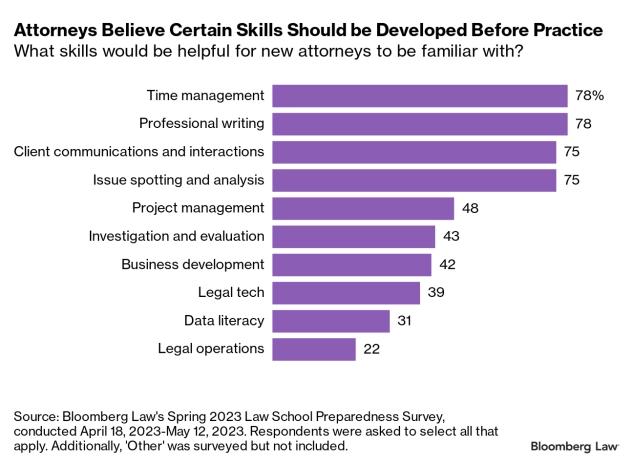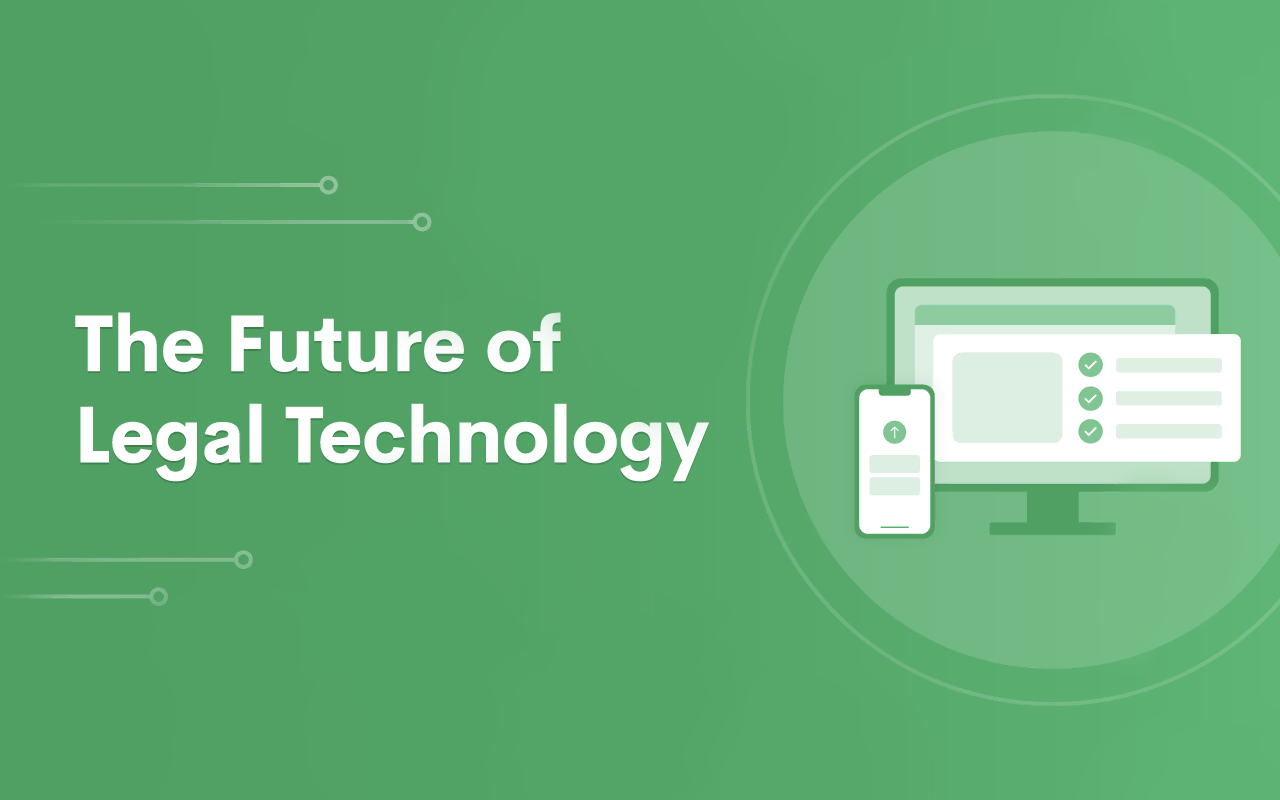The Future of Legal Technology

As the world continues to undergo rapid technological advancements, the legal industry has not been left behind (although some lawyers may wish it was). With emerging new technologies like artificial intelligence (AI) and machine learning, many people have started considering what legal software might mean for the legal profession’s future.
Most lawyers recognize the productivity and efficiency gains brought about by legal technology. To successfully practice law today, they need practical lawyering skills and technological savvy. However, Bloomberg Law’s Spring 2023 Law School Preparedness Survey, which included 936 practicing attorneys, revealed some interesting insights. Time management, professional writing, client communications, and interactions, as well as issue spotting and analysis, are highly valued skills for new attorneys. Surprisingly, the survey found that legal tech, data literacy, and legal operations don't enjoy the same level of recognition and importance."

Perhaps these established attorneys assume that law students and newly-minted lawyers learn what they need to know about tech in law school, but this is not typically the case. Only eight percent of second and third-year law students surveyed by Bloomberg reported taking a legal tech class.
While it might seem reasonable to think that today’s lawyers correspond with each other through two-way messaging software, use predictive analytics to drive their decisions, and handle their cases with client relationship management (CRM) systems, the reality is often very different. In some settings, lawyers still work the same way they have for decades—with paper calendars, legal pads, and Post-It notes.
Despite the low-tech reality, most lawyers recognize the need for change. Nearly 90% of the respondents to Bloomberg Law’s 2022 Legal Ops + Tech Survey said that “legal tech is important to meeting client demands and improving legal services.” Legal technology and innovation are revolutionizing the practice of law and reshaping the future of the legal profession by allowing firms to improve operations, enhance client service, maximize budgets, and help ensure a profitable outlook.
Is legal technology the future?
Yes, legal technology has already transformed the field and continues to grow as more and more adopt these tools
Why is legal tech growing? In addition to promoting greater efficiency and productivity, legal technology is also driving an industry-wide shift towards more flexible and convenient legal service delivery, which increases access to justice and benefits all parties involved. Some key trends and developments in the legal tech industry include:
1Automation and AI
Legal tech companies increasingly incorporate artificial intelligence (AI) and automation to streamline repetitive tasks, such as document review, contract analysis, and legal research.
2eDiscovery
Electronic discovery (eDiscovery) tools continue to evolve, enabling legal professionals to manage large volumes of electronic data more efficiently during investigations and the discovery phase of litigation.
3Online legal services
The rise of online legal service platforms provides tools for creating legal documents, accessing legal advice, and even dispute resolution.
4Blockchain
Blockchain technology can enhance security and transparency in legal processes, including smart contracts and document authentication.
5Cybersecurity and data privacy
Due to the sensitive nature of legal information, the legal tech sector is increasingly focused on cybersecurity and data privacy.
6Collaboration tools
Legal professionals are adopting cloud-based solutions and collaborative tools to enhance communication and workflow efficiency among legal teams.
7Regulatory compliance
Legal tech addresses the growing complexity of regulatory compliance by offering solutions that help businesses stay updated and compliant with evolving requirements.
8Legal analytics
Data analytics in the legal field provides insights into case outcomes, litigation trends, and legal strategy optimization.
The legal tech industry is experiencing significant growth and innovation, and Gartner forecasts that 12 percent of in-house legal budgets will be dedicated to legal tech by 2025.
What technology do lawyers use?
Successful lawyers use technology to work more efficiently and securely in an increasingly remote workplace. Here are some common examples of legal technology software used by today’s lawyers:
- Practice management platforms. Systems like Practice Panther offer robust tools designed to make managing and billing cases faster and easier.
- Software as a Service (SaaS). Software-as-a-Service programs like Microsoft 365 provide tools like Word, Excel, OneNote, Outlook, PowerPoint, SharePoint, Teams, and more.
- Word processors. Google Docs, a word processor similar to Microsoft Word, is a good option for attorneys whose work requires collaboration.
- Messaging apps. Platforms like Kenect allow users to directly sync contacts into the system, view a log of text conversations in real-time, and trigger messages based on case status.
- Online payment technology. Lawyers utilize software solutions like LawPay to issue invoices electronically and facilitate online payments.
- Marketing software. Pre-screening marketing software like Lawbrokr standardizes how law firms screen incoming traffic and qualify new leads.
- Video conferencing platforms. Attorneys who want click-to-dial functionality and one-click video conferencing capabilities favor all-in-one platforms like RingCentral for voice and video meetings, team messaging, and collaboration.
- Electronic signature systems. Electronic signature (eSignature) platforms like DocuSign make signing documents faster, easier, and more secure for lawyers and clients.
- Voice over Internet Protocol (VoIP) technology. VoIP platforms like Corvum use an internet connection to offer texting and calling for attorneys in various practice areas and integrate with Clio practice management software.
Lawmatics integrates with these and other popular legal tech applications currently used by many firms. These legal software integrations allow lawyers to automate the repetitive tasks between apps and build a best-of-breed tech stack.
What are the new technologies in the legal field?
The global pandemic required justice systems to turn to technology to function. This transition enabled continued access to justice and required lawyers to adopt technology and embrace emerging technologies in the legal world. Some legal technology trends in 2023 include:
1Online Dispute Resolution (ODR)
ODR platforms enable lawyers to resolve disputes online without in-person meetings or court appearances to save time and money.
2Virtual Reality (VR) and Augmented Reality (AR)
VR and AR technologies enhance legal education and training and provide clients with virtual experiences in areas like real estate and construction law.
3National Language Processing (NLP)
Automating speech or text via software allows legal professionals to gain the insight and scalability required to move quickly through large amounts of documents and data.
4Machine Learning (ML)
Initially used primarily for billing and invoicing, ML is now used to analyze vast quantities of court data to determine the next steps.
5Generative AI
Generative AI is a tool that is still in its infancy, and consequently, the more we learn, the more there is to understand. While Traditional AI aims to perform specific tasks based on predefined rules and patterns, Generative AI strives to create new data resembling human-created content.
Are lawyers likely to be replaced by AI?
No, not according to projections from the Bureau of Labor Statistics. The BLS predicts that the number of jobs for attorneys will grow by 10 percent from 2021-2031, faster than the average for all professions. In addition, many experts say AI has the potential to complement and expedite a lawyer’s work rather than replace it.
Although AI tools for lawyers have significantly transformed the legal industry and continue to do so, the role of lawyers involves complex decision-making, interpretation of nuanced information, and human-centric skills that technology cannot replicate. Here are some reasons why legal technology will not replace lawyers:
- Legal expertise: Lawyers provide more than just legal services; they offer expertise, judgment, and the ability to navigate complex situations that involve interpreting laws, understanding the context of cases, and making strategic decisions.
- Advocacy skills: Effective advocacy and negotiation require communication, persuasion, and strategy—human qualities not easily replicated by technology.
- Client relationships: Building relationships with clients, understanding their needs, and providing legal counsel require human skills that involve empathy, emotional intelligence, and understanding of individual circumstances.
- Ethical and moral considerations: Legal practice often involves ethical and moral decision-making. Lawyers reach conclusions that go beyond a strict interpretation of laws, considering the broader impact on society, fairness, and justice.
- Adaptability: The legal landscape is constantly evolving, with changes in laws, regulations, and societal norms. Lawyers are trained to adapt to these changes, stay informed, and apply their knowledge to new and unique situations.
- Complex problem-solving: Legal issues are often complex, involving multifaceted issues that require critical thinking and problem-solving skills. Lawyers are trained to analyze problems, synthesize information, and develop solutions to complicated legal challenges.
While legal technology, including artificial intelligence and automation, can assist lawyers by streamlining specific tasks, improving efficiency, and enhancing legal research, it functions more as a tool to augment and support the work of lawyers rather than replace them.
How will technology change in the future for lawyers?
The legal profession has always been constantly evolving and adapting to societal changes. From the introduction of computers in the workplace to the rise of the internet, social media, and remote work, lawyers have had to adjust to new technologies to remain relevant. Therefore, it is reasonable to assume that for lawyers, the future will involve adapting to new technologies.
Because of AI and machine learning, legal research has become more efficient and accurate, meaning that lawyers can now access vast amounts of legal data in a shorter period and with greater accuracy than ever before. However, this does not mean that lawyers will become obsolete; instead, lawyers must become more skilled in using these tools to ensure they provide accurate information. For example, in May 2023, a New York judge imposed $5,000 fines on two attorneys who used fake citations and legal opinions retrieved on the AI website ChatGPT to help write court filings for an aviation injury claim.
Legal technology also changes the legal profession by automating manual tasks with AI-powered software. Automation saves time and reduces the risk of human error, but it is not sophisticated enough to replace lawyers. Machines cannot replicate the interpretation of human language and the application of legal knowledge and expertise that human lawyers provide.
Technology is also having a positive impact on the way that lawyers interact with clients. With the increased use of video conferencing and other online tools, lawyers can now offer their services to clients regardless of their location, making legal services accessible and affordable to those who may not have been able to obtain them.
Do lawyers need technology?
Yes, technology has become an integral part of the legal profession. Law firms embracing technology increasingly rely on various tools to improve their efficiency, productivity, and delivery of legal services. Here are some of the reasons why lawyers need technology:
- Greater efficiency: Legal technology can automate tasks that consume much of a lawyer’s time, such as document review, legal research, and timekeeping. Document management software, legal research databases, and e-discovery software can automate routine tasks to allow lawyers to focus on more complex legal work, helping firms to work more efficiently and increase billable hours.
- Enhanced customer service: Clients expect their lawyers to provide a modern and efficient experience. Client satisfaction and loyalty often increase when lawyers adopt legal technology to offer faster, more accurate, and cost-effective legal services.
- Competitive advantage: Law firms that invest in legal technology often outdo their competitors in terms of productivity, responsiveness, and innovation to attract and retain clients and increase their market share.
- Cost savings: Technology investments may require an upfront cost, but they often result in significant cost savings over the long term. For example, AI-powered legal research tools can decrease the time and expense that conventional research techniques require.
- Improved security: Legal technology employs robust security measures, including multi-factor authentication, encryption, and intrusion detection systems to combat cyber threats.
- Increased compliance: Legal technology can help lawyers comply with regulatory requirements by providing the best tools for lawyers to manage and track legal documents, deadlines, and other important information.
At a time when law firms face increased pressure to transform their business models, digital transformation in the legal industry enables them to be more efficient and innovative, redefine the value that lawyers provide, and help diminish barriers that keep many from accessing legal services.
Step into the future of the legal profession in the digital era with Lawmatics
Lawmatics is the #1 automation platform for law firms, offering legal client intake, CRM, marketing automation, billing, and much more, all in one easy-to-use software system.
“
“Lawmatics is a well-designed and considered CRM, a rarity in legal tech. In my experience, most legal tech is outdated and cumbersome—so Lawmatics really stands out. It’s also surprisingly customizable, allowing you to add hundreds of custom fields with different types. Their automation builder is colorful and simple to use, allowing you to automate almost anything you'd need to do by hand in the tool. As a technologist who helps companies set up and use tools like this, I’m very impressed.”
— Giovanni S.
Technology is changing the legal field. With Lawmatics, law firms streamline their operations, engage and nurture clients, and grow their practices. To learn more about how our cutting-edge platform will prepare your firm for the future in a constantly evolving legal industry, get a demo today.


